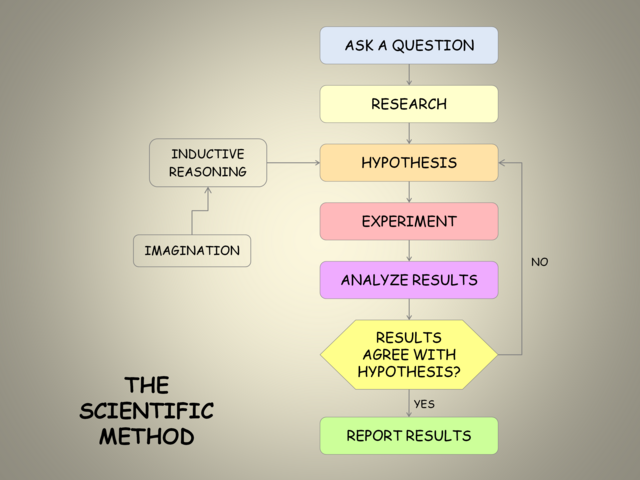Imagination and The Scientific Method
In the scientific method, the ability to formulate a new idea or hypothesis is a vital component of the process. Without hypothesis there can be no scientific evolution. We test each new hypothesis against experimental data to affirm its validity, then we move on to the next challenge. Interestingly for all its wonderful progress over the last few centuries, the scientific method has been unable, and perhaps unwilling, to hypothesize where its own hypotheses come from.

The human imagination is perhaps the best ‘explanation’ we have for the mechanics behind inductive reasoning, for it is from imagination that hypotheses emerge. But do we really know what imagination is? If we are to accept that imagination is the fundamental cog in the recursive wheel of the scientific method, then it would be reasonable to ask that the scientific method studies the nature of itself, of imagination.
Professor Hawking declared there is no creator God of the universe, and that even consciousness does not exist. They are undetectable with scientific instruments and have no substance in the phenomenal world. The professor enjoyed considerable fame and success for his work on black holes, and in particular his thesis on Hawking radiation. Without the sublime faculty of imagination however, together with his outstanding intellect, such a feat would surely have been impossible. And yet if we were to say that imagination does not exist because it is undetectable, then the entire scientific method collapses.
Science may of course claim that imagination is a neurological function of the brain and nervous system, a skill the body has acquired as a result of evolution. Be that as it may, it is for science not only to explain the what but also to understand the why and the how. How does imagination work? Is it predictable? Etc. Since science is a result of imagination, it would be circular logic to also claim that imagination is a matter of science.

Imagination is essentially the ability of the mind to hold images, and to process these chaotic images into a sense of order. In the scientific method, imagination is a response to the contradiction between theory and observation (perhaps not immediately but over time as new hypotheses emerge). This contradiction exists only in the mind of the observer of course; it is an uncomfortable situation that seeks reprieve. Just as in Archimedes’ famous eureka moment, imagination serves to reconcile conflict between theory and experiment.
It would appear therefore that the existence of imagination is very much dependent on the existence of contradiction. One is a precursor to the other. A contradiction is essentially a DILEMMA (which is Greek for ‘two premises’). When we are unable to decide on a course of action, for example, we have to sit it out and hope that inspiration will come our way.
It is generally accepted (and perhaps wrongly so) that imagination is a creative process, a wonderful human attribute that should be encouraged. When a child is urged to use his imagination to draw a picture of a house, he will feel compelled to respond; whereupon he focuses his attention on the matter at hand. There is a dilemma created by psychological pressure that exists between what is (a blank sheet of paper) and what should be (a picture). Again, it is a mildly uncomfortable situation that motivates the child to respond to the challenge. When the child completes his rendition of the house he feels genuinely satisfied. In that sense, from an early age we learn that imagination is a source of satisfaction even though empirically we know it cannot exist without conflict. Imagination is thoroughly addictive. And while that might be taken in a negative light, it should be noted that without imagination this article would not have been written.
“Our scientific ideas are of value to the degree in which we have felt ourselves lost before a question; have seen its problematic nature, and have realized that we cannot find support in accepted notions, in prescriptions, in proverbs, nor in mere words. The man who discovers a new scientific truth has previously had to smash to atoms almost everything he had learned, and arrives at the new truth with hands stained with blood from the slaughter of a thousand platitudes.”
~ Jose Ortega y Gasset, Revolt of the Masses
Congratulations @banjo369! You have received a personal award!
Click on the badge to view your own Board of Honor on SteemitBoard.
Congratulations @banjo369! You have completed some achievement on Steemit and have been rewarded with new badge(s) :
Click on any badge to view your own Board of Honor on SteemitBoard.
For more information about SteemitBoard, click here
If you no longer want to receive notifications, reply to this comment with the word
STOP